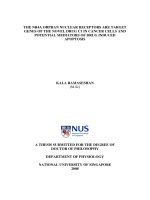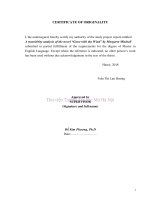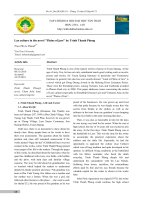the novel victory
Bạn đang xem bản rút gọn của tài liệu. Xem và tải ngay bản đầy đủ của tài liệu tại đây (1.23 MB, 302 trang )
TheProjectGutenbergEBookofVictory,byJosephConrad
ThiseBookisfortheuseofanyoneanywhereatnocostandwith
almostnorestrictionswhatsoever.Youmaycopyit,giveitawayor
re-useitunderthetermsoftheProjectGutenbergLicenseincluded
withthiseBookoronlineatwww.gutenberg.org
Title:Victory
Author:JosephConrad
ReleaseDate:January9,2006[EBook#6378]
LastUpdated:March2,2018
Language:English
***STARTOFTHISPROJECTGUTENBERGEBOOKVICTORY***
ProducedbyTracyCampandDavidWidger
VICTORY:ANISLANDTALE
ByJosephConrad
CONTENTS
NOTETOTHEFIRSTEDITION
AUTHOR'SNOTE
PARTONE
CHAPTERONE
CHAPTERTWO
CHAPTERTHREE
CHAPTERFOUR
CHAPTERFIVE
CHAPTERSIX
CHAPTERSEVEN
PARTTWO
CHAPTERONE
CHAPTERTWO
CHAPTERTHREE
CHAPTERFOUR
CHAPTERFIVE
CHAPTERSIX
CHAPTERSEVEN
CHAPTEREIGHT
PARTTHREE
CHAPTERONE
CHAPTERTWO
CHAPTERTHREE
CHAPTERFOUR
CHAPTERFIVE
CHAPTERSIX
CHAPTERSEVEN
CHAPTEREIGHT
CHAPTERNINE
CHAPTERTEN
PARTFOUR
CHAPTERONE
CHAPTERTWO
CHAPTERTHREE
CHAPTERFOUR
CHAPTERFIVE
CHAPTERSIX
CHAPTERSEVEN
CHAPTEREIGHT
CHAPTERNINE
CHAPTERTEN
CHAPTERELEVEN
CHAPTERTWELVE
CHAPTERTHIRTEEN
CHAPTERFOURTEEN
NOTETOTHEFIRSTEDITION
Thelastwordofthisnovelwaswrittenon29May1914.Andthatlastword
wasthesinglewordofthetitle.
Those were the times of peace. Now that the moment of publication
approachesIhavebeenconsideringthediscretionofalteringthetitle-page.The
word “Victory” the shining and tragic goal of noble effort, appeared too great,
tooaugust,tostandattheheadofamerenovel.Therewasalsothepossibilityof
falling under the suspicion of commercial astuteness deceiving the public into
thebeliefthatthebookhadsomethingtodowithwar.
Of that, however, I was not afraid very much. What influenced my decision
most were the obscure promptings of that pagan residuum of awe and wonder
whichlurksstillatthebottomofouroldhumanity.“Victory”wasthelastwordI
hadwritteninpeace-time.Itwasthelastliterarythoughtwhichhadoccurredto
mebeforethedoorsoftheTempleofJanusflyingopenwithacrashshookthe
minds,thehearts,theconsciencesofmenallovertheworld.Suchcoincidence
couldnotbetreatedlightly.AndImadeupmymindtoletthewordstand,inthe
same hopeful spirit in which some simple citizen of Old Rome would have
“acceptedtheOmen.”
The second point on which I wish to offer a remark is the existence (in the
novel)ofapersonnamedSchomberg.
That I believe him to be true goes without saying. I am not likely to offer
pinchbeckwarestomypublicconsciously.Schombergisanoldmemberofmy
company. A very subordinate personage in Lord Jim as far back as the year
1899, he became notably active in a certain short story of mine published in
1902.Hereheappearsinastilllargerpart,truetolife(Ihope),butalsotrueto
himself.Only,inthisinstance,hisdeeperpassionscomeintoplay,andthushis
grotesquepsychologyiscompletedatlast.
I don't pretend to say that this is the entire Teutonic psychology; but it is
indubitablythepsychologyofaTeuton.Myobjectinmentioninghimhereisto
bringoutthefactthat,farfrombeingtheincarnationofrecentanimosities,heis
thecreatureofmyolddeep-seated,and,asitwere,impartialconviction.
J.C.
AUTHOR'SNOTE
OnapproachingthetaskofwritingthisNoteforVictory,thefirstthingIam
consciousofistheactualnearnessofthebook,itsnearnesstomepersonally,to
thevanishedmoodinwhichitwaswritten,andtothemixedfeelingsarousedby
thecriticalnoticesthebookobtainedwhenfirstpublishedalmostexactlyayear
afterthebeginningofthewar.Thewritingofitwasfinishedin1914longbefore
the murder of an Austrian Archduke sounded the first note of warning for a
worldalreadyfullofdoubtsandfears.
The contemporaneous very short Author's Note which is preserved in this
edition bears sufficient witness to the feelings with which I consented to the
publication of the book. The fact of the book having been published in the
United States early in the year made it difficult to delay its appearance in
England any longer. It came out in the thirteenth month of the war, and my
conscience was troubled by the awful incongruity of throwing this bit of
imagined drama into the welter of reality, tragic enough in all conscience, but
even more cruel than tragic and more inspiring than cruel. It seemed awfully
presumptuous to think there would be eyes to spare for those pages in a
community which in the crash of the big guns and in the din of brave words
expressingthetruthofanindomitablefaithcouldnotbutfeeltheedgeofasharp
knifeatitsthroat.
TheunchangingManofhistoryiswonderfullyadaptablebothbyhispowerof
enduranceandinhiscapacityfordetachment.Thefactseemstobethattheplay
ofhisdestinyistoogreatforhisfearsandtoomysteriousforhisunderstanding.
WerethetrumpoftheLastJudgementtosoundsuddenlyonaworkingdaythe
musicianathispianowouldgoonwithhisperformanceofBeethoven'ssonata
and the cobbler at his stall stick to his last in undisturbed confidence in the
virtues of the leather. And with perfect propriety. For what are we to let
ourselvesbedisturbedbyanangel'svengefulmusictoomightyforourearsand
too awful for our terrors? Thus it happens to us to be struck suddenly by the
lightningofwrath.Thereaderwillgoonreadingifthebookpleaseshimandthe
criticwillgooncriticizingwiththatfacultyofdetachmentbornperhapsfroma
sense of infinite littleness and which is yet the only faculty that seems to
assimilatemantotheimmortalgods.
Itisonlywhenthecatastrophematchesthenaturalobscurityofourfatethat
eventhebestrepresentativeoftheraceisliabletolosehisdetachment.Itisvery
obvious that on the arrival of the gentlemanly Mr. Jones, the single-minded
Ricardo, and the faithful Pedro, Heyst, the man of universal detachment, loses
hismentalself-possession,thatfineattitudebeforetheuniversallyirremediable
whichwearsthenameofstoicism.Itisallamatterofproportion.Thereshould
have been a remedy for that sort of thing. And yet there is no remedy. Behind
this minute instance of life's hazards Heyst sees the power of blind destiny.
Besides, Heyst in his fine detachment had lost the habit of asserting himself. I
don'tmeanthecourageofself-assertion,eithermoralorphysical,butthemere
wayofit,thetrickofthething,thereadinessofmindandtheturnofthehand
that come without reflection and lead the man to excellence in life, in art, in
crime,invirtue,and,forthematterofthat,eveninlove.Thinkingisthegreat
enemyofperfection.Thehabitofprofoundreflection,Iamcompelledtosay,is
themostperniciousofallthehabitsformedbythecivilizedman.
But I wouldn't be suspected even remotely of making fun of Axel Heyst. I
have always liked him. The flesh-and-blood individual who stands behind the
infinitely more familiar figure of the book I remember as a mysterious Swede
rightenough.Whetherhewasabaron,too,Iamnotsocertain.Hehimselfnever
laidclaimtothatdistinction.Hisdetachmentwastoogreattomakeanyclaims,
bigorsmall,onone'scredulity.IwillnotsaywhereImethimbecauseIfearto
givemyreadersawrongimpression,sinceamarkedincongruitybetweenaman
andhissurroundingsisoftenaverymisleadingcircumstance.Webecamevery
friendlyforatime,andIwouldnotliketoexposehimtounpleasantsuspicions
though,personally,Iamsurehewouldhavebeenindifferenttosuspicionsashe
wasindifferenttoalltheotherdisadvantagesoflife.HewasnotthewholeHeyst
ofcourse;heisonlythephysicalandmoralfoundationofmyHeystlaidonthe
groundofashortacquaintance.Thatitwasshortwascertainlynotmyfaultfor
hehadcharmedmebythemereamenityofhisdetachmentwhich,inthiscase,I
cannot help thinking he had carried to excess. He went away from his rooms
withoutleavingatrace.Iwonderedwherehehadgoneto—butnowIknow.He
vanishedfrommykenonlytodriftintothisadventurethat,unavoidable,waited
forhiminaworldwhichhepersistedinlookinguponasamalevolentshadow
spinninginthesunlight.Ofteninthecourseofyearsanexpressedsentiment,the
particularsenseofaphraseheardcasually,wouldrecallhimtomymindsothatI
havefastenedontohimmanywordsheardonothermen'slipsandbelongingto
othermen'slessperfect,lesspatheticmoods.
ThesameobservationwillapplymutatismutandistoMr.Jones,whoisbuilt
onamuchslendererconnection.Mr.Jones(orwhateverhisnamewas)didnot
driftawayfrom me.Heturnedhisbackonmeandwalked outoftheroom.It
wasinalittlehotelintheislandofSt.ThomasintheWestIndies(intheyear
'75)wherewefoundhimonehotafternoonextendedonthreechairs,allalonein
theloudbuzzingoffliestowhichhisimmobilityandhiscadaverousaspectgave
amostgruesomesignificance.Ourinvasionmusthavedispleasedhimbecause
he got off the chairs brusquely and walked out, leaving with me an indelibly
weirdimpressionofhisthinshanks.Oneofthemenwithmesaidthatthefellow
wasthemostdesperategamblerhehadevercomeacross.Isaid:“Aprofessional
sharper?”andgotforananswer:“He'saterror;butImustsaythatuptoacertain
pointhewillplayfair....”Iwonderwhatthepointwas.Ineversawhimagain
because I believe he went straight on board a mail-boat which left within the
hourforotherportsofcallinthedirectionofAspinall.Mr.Jones'scharacteristic
insolencebelongstoanothermanofaquitedifferenttype.Iwillsaynothingas
to the origins of his mentality because I don't intend to make any damaging
admissions.
ItsohappenedthattheverysameyearRicardo—thephysicalRicardo—wasa
fellowpassengerofmineonboardanextremelysmallandextremelydirtylittle
schooner,duringafourdays'passagebetweentwoplacesintheGulfofMexico
whosenamesdon'tmatter.Forthemostparthelayondeckaftasitwereatmy
feet, and raising himself from time to time on his elbow would talk about
himselfandgoontalking,notexactlytomeorevenatme(hewouldnoteven
lookupbutkepthiseyesfixedonthedeck)butmoreasifcommuninginalow
voicewithhisfamiliardevil.Nowandthenhewouldgivemeaglanceandmake
thehairsofhisstifflittlemoustachestirquaintly.Hiseyesweregreenandevery
catIseetothisdayremindsmeoftheexactcontourofhisface.Whathewas
travellingfororwhatwashisbusinessinlifeheneverconfidedtome.Truthto
say, the only passenger on board that schooner who could have talked openly
about his activities and purposes was a very snuffy and conversationally
delightfulfriar,thesuperiorofaconvent,attendedbyaveryyounglaybrother,
ofaparticularlyferociouscountenance.Wehadwithusalso,lyingprostratein
the dark and unspeakable cuddy of that schooner, an old Spanish gentleman,
owner of much luggage and, as Ricardo assured me, very ill indeed. Ricardo
seemed to be either a servant or the confidant of that aged and distinguishedlooking invalid, who early on the passage held a long murmured conversation
withthefriar,andafterthatdidnothingbutgroanfeebly,smokecigarettes,and
nowandthencallforMartininavoicefullofpain.Thenhewhohadbecome
Ricardointhebookwouldgobelowintothatbeastlyandnoisomehole,remain
theremysteriously,andcomingupondeckagainwithafaceonwhichnothing
couldberead,wouldaslikelyasnotresumeformyedificationtheexpositionof
his moral attitude towards life illustrated by striking particular instances of the
most atrocious complexion. Did he mean to frighten me? Or seduce me? Or
astonish me? Or arouse my admiration? All he did was to arouse my amused
incredulity. As scoundrels go he was far from being a bore. For the rest my
innocence was so great then that I could not take his philosophy seriously. All
thetimehekeptoneearturnedtothecuddyinthemannerofadevotedservant,
butIhadtheideathatinsomewayorotherhehadimposedtheconnectionon
theinvalidforsomeendofhisown.Thereader,therefore,won'tbesurprisedto
hearthatonemorningIwastoldwithoutanyparticularemotionbythepadrone
of the schooner that the “rich man” down there was dead: He had died in the
night.Idon'tremembereverbeingsomovedbythedesolateendofacomplete
stranger. I looked down the skylight, and there was the devoted Martin busy
cording cowhide trunks belonging to the deceased whose white beard and
hookednoseweretheonlypartsIcouldmakeoutinthedarkdepthsofahorrible
stuffybunk.
As it fell calm in the course of the afternoon and continued calm during all
that night and the terrible, flaming day, the late “rich man” had to be thrown
overboard at sunset, though as a matter of fact we were in sight of the low
pestilential mangrove-lined coast of our destination. The excellent Father
Superior mentioned to me with an air of immense commiseration: “The poor
manhasleftayoungdaughter.”WhowastolookafterherIdon'tknow,butI
saw the devoted Martin taking the trunks ashore with great care just before I
landedmyself.Iwouldperhapshavetrackedthewaysofthatmanofimmense
sincerityforalittlewhile,butIhadsomeofmyownverypressingbusinessto
attendto,whichintheendgotmixedupwithanearthquakeandsoIhadnotime
to give to Ricardo. The reader need not be told that I have not forgotten him,
though.
MycontactwiththefaithfulPedrowasmuchshorterandmyobservationof
him was less complete but incomparably more anxious. It ended in a sudden
inspirationtogetoutofhisway.Itwasinahovelofsticksandmatsbytheside
ofapath.AsIwentinthereonlytoaskforabottleoflemonadeIhavenotto
thisdaytheslightestideawhatinmyappearanceoractionscouldhaveroused
his terrible ire. It became manifest to me less than two minutes after I had set
eyesonhimforthefirsttime,andthoughimmenselysurprisedofcourseIdidn't
stop to think it out I took the nearest short cut—through the wall. This bestial
apparition and a certain enormous buck nigger encountered in Haiti only a
couple of months afterwards, have fixed my conception of blind, furious,
unreasoningrage,asmanifestedinthehumananimal,totheendofmydays.Of
theniggerIusedtodreamforyearsafterwards.OfPedronever.Theimpression
waslessvivid.Igotawayfromhimtooquickly.
Itseemstomebutnaturalthatthosethreeburiedinacornerofmymemory
should suddenly get out into the light of the world—so natural that I offer no
excusefortheirexistence,Theywerethere,theyhadtocomeout;andthisisa
sufficient excuse for a writer of tales who had taken to his trade without
preparation, or premeditation, and without any moral intention but that which
pervadesthewholeschemeofthisworldofsenses.
SincethisNoteismostlyconcernedwithpersonalcontactsandtheoriginsof
thepersonsinthetale,IamboundalsotospeakofLena,becauseifIwereto
leaveheroutitwouldlooklikeaslight;andnothingwouldbefurtherfrommy
thoughts thanputting aslightonLena.Ifofallthepersonagesinvolvedinthe
“mystery of Samburan” I have lived longest with Heyst (or with him I call
Heyst)itwasather,whomIcallLena,thatIhavelookedthelongestandwitha
mostsustainedattention.ThisattentionoriginatedinidlenessforwhichIhavea
naturaltalent.OneeveningIwanderedintoacafe,inatownnotofthetropics
butoftheSouthofFrance.Itwasfilledwithtobaccosmoke,thehumofvoices,
the rattling of dominoes, and the sounds of strident music. The orchestra was
rathersmallerthantheonethatperformedatSchomberg'shotel,hadtheairmore
of a family party than of an enlisted band, and, I must confess, seemed rather
morerespectablethantheZangiacomomusicalenterprise.Itwaslesspretentious
also,morehomelyandfamiliar,sotospeak,insomuchthatintheintervalswhen
alltheperformerslefttheplatformoneofthemwentamongstthemarbletables
collecting offeringsofsousandfrancsinabatteredtinreceptacle recallingthe
shapeofasauceboat.Itwasagirl.Herdetachmentfromhertaskseemstome
now to have equalled or even surpassed Heyst's aloofness from all the mental
degradations to which a man's intelligence is exposed in its way through life.
Silentandwide-eyedshewentfromtabletotablewiththeairofasleep-walker
andwith noothersoundbuttheslightrattleofthecoinstoattractattention.It
was long after the sea-chapter of my life had been closed but it is difficult to
discardcompletelythecharacteristicsofhalfalifetime,anditwasinsomething
of the Jack-ashore spirit that I dropped a five-franc piece into the sauceboat;
whereupon the sleep-walker turned her head to gaze at me and said “Merci,
Monsieur” in a tone in which there was no gratitude but only surprise. I must
havebeenidleindeedtotakethetroubletoremarkonsuchslightevidencethat
the voice was very charming and when the performers resumed their seats I
shiftedmypositionslightlyinordernottohavethatparticularperformerhidden
frommebythelittlemanwiththebeardwhoconducted,andwhomightforallI
knowhavebeenherfather,butwhoserealmissioninlifewastobeamodelfor
the Zangiacomo of Victory. Having got a clear line of sight I naturally (being
idle)continuedtolookatthegirlthroughallthesecondpartoftheprogramme.
Theshapeofherdarkheadinclinedovertheviolinwasfascinating,and,while
restingbetweenthepiecesofthatinterminableprogrammeshewas,inherwhite
dressandwithherbrownhandsreposinginherlap,theveryimageofdreamy
innocence.Themature,bad-temperedwomanatthepianomighthavebeenher
mother,thoughtherewasnottheslightestresemblancebetweenthem.AllIam
certainofintheirpersonalrelationtoeachotheristhatcruelpinchontheupper
partofthearm.ThatIamsureIhaveseen!Therecouldbenomistake.Iwasin
too idle a mood to imagine such a gratuitous barbarity. It may have been
playfulness,yetthegirljumpedupasifshehadbeenstungbyawasp.Itmay
havebeenplayfulness.YetIsawplainlypoor“dreamyinnocence”rubgentlythe
affectedplaceasshefiledoffwiththeother performersdownthe middleaisle
between the marble tables in the uproar of voices, the rattling of dominoes
throughablueatmosphereoftobaccosmoke.Ibelievethatthosepeopleleftthe
townnextday.
Orperhapstheyhadonlymigratedtotheotherbigcafe,ontheothersideof
thePlacedelaComedie.Itisverypossible.Ididnotgoacrosstofindout.Itwas
myperfectidlenessthathadinvestedthegirlwithapeculiarcharm,andIdidnot
wanttodestroyitbyanysuperfluousexertion.Thereceptivityofmyindolence
madetheimpressionsopermanentthatwhenthemomentcameforhermeeting
withHeystIfeltthatshewouldbeheroicallyequaltoeverydemandoftherisky
anduncertainfuture.IwassoconvincedofitthatIlethergowithHeyst,Iwon't
say without a pang but certainly without misgivings. And in view of her
triumphant end what more could I have done for her rehabilitation and her
happiness?
1920.J.C.
VICTORY:ANISLANDTALE
PARTONE
CHAPTERONE
There is, as every schoolboy knows in this scientific age, a very close
chemical relation between coal and diamonds. It is the reason, I believe, why
some people allude to coal as “black diamonds.” Both these commodities
represent wealth; but coal is a much less portable form of property. There is,
from that point of view, a deplorable lack of concentration in coal. Now, if a
coal-mine could be put into one's waistcoat pocket—but it can't! At the same
time,thereisafascinationincoal,thesupremecommodityoftheageinwhich
we are camped like bewildered travellers in a garish, unrestful hotel. And I
suppose those two considerations, the practical and the mystical, prevented
Heyst—AxelHeyst—fromgoingaway.
TheTropicalBeltCoalCompanywentintoliquidation.Theworldoffinance
is a mysterious world in which, incredible as the fact may appear, evaporation
precedes liquidation. First the capital evaporates, and then the company goes
into liquidation. These are very unnatural physics, but they account for the
persistent inertia of Heyst, at which we “out there” used to laugh among
ourselves—but not inimically. An inert body can do no harm to anyone,
provokes nohostility,is scarcelyworthderision.Itmay,indeed,beinthe way
sometimes;butthiscouldnotbesaidofAxelHeyst.Hewasoutofeverybody's
way,asifhewereperchedonthehighestpeakoftheHimalayas,andinasense
asconspicuous.Everyoneinthatpartoftheworldknewofhim,dwellingonhis
little island. An island is but the top of a mountain. Axel Heyst, perched on it
immovably,wassurrounded,insteadoftheimponderablestormyandtransparent
oceanofairmergingintoinfinity,byatepid,shallowsea;apassionlessoffshoot
ofthegreatwaterswhichembracethecontinentsofthisglobe.Hismostfrequent
visitors were shadows, the shadows of clouds, relieving the monotony of the
inanimate, brooding sunshine of the tropics. His nearest neighbour—I am
speaking now of things showing some sort of animation—was an indolent
volcano which smoked faintly all day with its head just above the northern
horizon, and at night levelled at him, from amongst the clear stars, a dull red
glow, expanding and collapsing spasmodically like the end of a gigantic cigar
puffedatintermittentlyinthedark.AxelHeystwasalsoasmoker;andwhenhe
loungedoutonhisverandawithhischeroot,thelastthingbeforegoingtobed,
hemadeinthenightthesamesortofglowandofthesamesizeasthatotherone
somanymilesaway.
Inasense,thevolcanowascompanytohimintheshadesofthenight—which
wereoftentoothick,onewouldthink,toletabreathofairthrough.Therewas
seldom enough wind to blow a feather along. On most evenings of the year
Heystcouldhavesatoutsidewithanakedcandletoreadoneofthebooksleft
himbyhislatefather.Itwasnotameanstore.Butheneverdidthat.Afraidof
mosquitoes, very likely. Neither was he ever tempted by the silence to address
any casual remarks to the companion glow of the volcano. He was not mad.
Queerchap—yes,thatmayhavebeensaid,andinfactwassaid;butthereisa
tremendousdifferencebetweenthetwo,youwillallow.
OnthenightsoffullmoonthesilencearoundSamburan—the“RoundIsland”
of the charts—wasdazzling;and inthefloodofcoldlightHeystcouldseehis
immediate surroundings, which had the aspect of an abandoned settlement
invaded by the jungle: vague roofs above low vegetation, broken shadows of
bamboo fences in the sheen of long grass, something like an overgrown bit of
roadslantingamongraggedthicketstowardstheshoreonlyacoupleofhundred
yards away, with a black jetty and a mound of some sort, quite inky on its
unlightedside.Butthemostconspicuousobjectwasagiganticblackboardraised
on two posts and presenting to Heyst, when the moon got over that side, the
whiteletters“T.B.C.Co.”inarowatleasttwofeethigh.Theseweretheinitials
of the Tropical Belt Coal Company, his employers—his late employers, to be
precise.
According to the unnatural mysteries of the financial world, the T. B. C.
Company's capital having evaporated in the course of two years, the company
went into liquidation—forced, I believe, not voluntary. There was nothing
forcible in the process, however. It was slow; and while the liquidation—in
LondonandAmsterdam—pursueditslanguidcourse,AxelHeyst,styledinthe
prospectus“managerinthetropics,”remainedathispostonSamburan,theNo.
1coaling-stationofthecompany.
Anditwasnotmerelyacoaling-station.Therewasacoal-minethere,withan
outcropin the hillside lessthan fivehundredyardsfromthericketywharfand
theimposingblackboard.Thecompany'sobjecthadbeentogetholdofallthe
outcrops on tropical islands and exploit them locally. And, Lord knows, there
wereanyamountofoutcrops.ItwasHeystwhohadlocatedmostoftheminthis
partofthetropicalbeltduringhisratheraimlesswanderings,andbeingaready
letter-writerhadwrittenpagesandpagesaboutthemtohisfriendsinEurope.At
least,soitwassaid.
We doubted whether he had any visions of wealth—for himself, at any rate.
Whatheseemedmostlyconcernedforwasthe“strideforward,”asheexpressed
it,inthegeneralorganizationoftheuniverse,apparently.Hewasheardbymore
thanahundredpersonsintheislandstalkingofa“greatstrideforwardforthese
regions.” The convinced wave of the hand which accompanied the phrase
suggested tropical distances being impelled onward. In connection with the
finishedcourtesyofhismanner,itwaspersuasive,oratanyratesilencing—fora
time,atleast.Nobodycaredtoarguewithhimwhenhetalkedinthisstrain.His
earnestnesscoulddonoharmtoanybody.Therewasnodangerofanyonetaking
seriouslyhisdreamoftropicalcoal,sowhatwastheuseofhurtinghisfeelings?
Thusreasonedmeninreputablebusinessofficeswherehehadhisentreeasa
person who came out East with letters of introduction—and modest letters of
credit, too—some years before these coal-outcrops began to crop up in his
playfullycourteoustalk.Fromthefirsttherewassomedifficultyinmakinghim
out.Hewasnotatraveller.Atravellerarrivesanddeparts,goesonsomewhere.
Heyst did not depart. I met a man once—the manager of the branch of the
Oriental Banking Corporation in Malacca—to whom Heyst exclaimed, in no
connectionwithanythinginparticular(itwasinthebilliard-roomoftheclub):
“Iamenchantedwiththeseislands!”
He shot it out suddenly, a propos des bottes, as the French say, and while
chalkinghiscue.Andperhapsitwassomesortofenchantment.Therearemore
spellsthanyourcommonplacemagicianseverdreamedof.
Roughlyspeaking,acirclewitharadiusofeighthundredmilesdrawnrounda
pointinNorthBorneowasinHeyst'scaseamagiccircle.ItjusttouchedManila,
and he had been seen there. It just touched Saigon, and he was likewise seen
there once. Perhaps these were his attempts to break out. If so, they were
failures.Theenchantmentmusthavebeenanunbreakableone.Themanager—
the man who heard the exclamation—had been so impressed by the tone,
fervour, rapture, what you will, or perhaps by the incongruity of it that he had
relatedtheexperiencetomorethanoneperson.
“Queerchap,thatSwede,”washisonlycomment;butthisistheoriginofthe
name“EnchantedHeyst”whichsomefellowsfastenedonourman.
Healsohadothernames.Inhisearlyyears,longbeforehegotsobecomingly
bald on the top, he went to present a letter of introduction to Mr. Tesman of
Tesman Brothers, a Sourabaya firm—tip-top house. Well, Mr. Tesman was a
kindly,benevolentoldgentleman.Hedidnotknowwhattomakeofthatcaller.
After telling him that they wished to render his stay among the islands as
pleasantaspossible,andthattheywerereadytoassisthiminhisplans,andso
on,andafterreceivingHeyst'sthanks—youknowtheusualkindofconversation
—heproceededtoqueryinaslow,paternaltone:
“Andyouareinterestedin—?”
“Facts,”brokeinHeystinhiscourtlyvoice.“There'snothingworthknowing
butfacts.Hardfacts!Factsalone,Mr.Tesman.”
Idon'tknowifoldTesmanagreedwithhimornot,buthemusthavespoken
aboutit,because,foratime,ourmangotthenameof“HardFacts.”Hehadthe
singulargoodfortunethathissayingsstucktohimandbecamepartofhisname.
Thereafter he mooned about the Java Sea in some of the Tesmans' trading
schooners, and then vanished, on board an Arab ship, in the direction of New
Guinea.Heremainedsolonginthatoutlyingpartofhisenchantedcirclethathe
was nearly forgotten before he swam into view again in a native proa full of
Goramvagabonds,burntblackbythesun,verylean,hishairmuchthinned,and
aportfolioofsketchesunderhisarm.Heshowedthesewillingly,butwasvery
reservedastoanythingelse.Hehadhadan“amusingtime,”hesaid.Amanwho
willgotoNewGuineaforfun—well!
Later,yearsafterwards,whenthelastvestigesofyouthhadgoneoffhisface
and all the hair off the top of his head, and his red-gold pair of horizontal
moustacheshadgrowntoreallynobleproportions,acertaindisreputablewhite
man fastened upon him an epithet. Putting down with a shaking hand a long
glass emptied of its contents—paid for by Heyst—he said, with that deliberate
sagacitywhichnomerewater-drinkereverattained:
“Heyst'sapuffectg'n'lman.Puffect!Buthe'saut-uto-utopist.”
Heyst had just gone out of the place of public refreshment where this
pronouncementwasvoiced.Utopist,eh?Uponmyword,theonlythingIheard
himsaywhichmighthavehadabearingonthepointwashisinvitationtoold
McNab himself. Turning with that finished courtesy of attitude, movement
voice, which was his obvious characteristic, he had said with delicate
playfulness:
“Comealongandquenchyourthirstwithus,Mr.McNab!”
Perhapsthatwasit.Amanwhocouldpropose,evenplayfully,toquenchold
McNab'sthirstmusthavebeenautopist,apursuerofchimeras;forofdownright
irony Heyst was not prodigal. And, may be, this was the reason why he was
generally liked. At that epoch in his life, in the fulness of his physical
development, of a broad, martial presence, with his bald head and long
moustaches,heresembledtheportraitsofCharlesXII.,ofadventurousmemory.
However,therewasnoreasontothinkthatHeystwasinanywayafightingman.
CHAPTERTWO
ItwasaboutthistimethatHeystbecameassociatedwithMorrisononterms
about which people were in doubt. Some said he was a partner, others said he
was a sortof payingguest,buttherealtruthofthematterwasmorecomplex.
OnedayHeystturnedupinTimor.WhyinTimor,ofallplacesintheworld,no
one knows. Well, he was mooning about Delli, that highly pestilential place,
possiblyinsearchofsomeundiscoveredfacts,whenhecameinthestreetupon
Morrison, who, in his way, was also an “enchanted” man. When you spoke to
Morrison of going home—he was from Dorsetshire—he shuddered. He said it
wasdarkandwetthere;thatitwaslikelivingwithyourheadandshouldersina
moistgunny-bag.Thatwasonlyhisexaggeratedstyleoftalking.Morrisonwas
“oneofus.”HewasownerandmasteroftheCapricorn,tradingbrig,andwas
understood to be doing well with her, except for the drawback of too much
altruism. He was the dearly beloved friend of a quantity of God-forsaken
villages up dark creeks and obscure bays, where he traded for produce. He
would often sail, through awfully dangerous channels up to some miserable
settlement,onlytofindaveryhungrypopulationclamorousforrice,andwithout
so much “produce” between them as would have filled Morrison's suitcase.
Amid general rejoicings, he would land the rice all the same, explain to the
peoplethatitwasanadvance,thattheywereindebttohimnow;wouldpreach
tothemenergyandindustry,andmakeanelaboratenoteinapocket-diarywhich
healwayscarried;andthiswouldbetheendofthattransaction.Idon'tknowif
Morrisonthoughtso,butthevillagershadnodoubtwhateveraboutit.Whenever
acoastvillagesightedthebrigitwouldbegintobeatallitsgongsandhoistall
its streamers, and all its girls would put flowers in their hair and the crowd
would line the river bank, and Morrison would beam and glitter at all this
excitement through his single eyeglass with an air of intense gratification. He
was tall and lantern-jawed, and clean-shaven, and looked like a barrister who
hadthrownhiswigtothedogs.
Weusedtoremonstratewithhim:
“Youwillneverseeanyofyouradvancesifyougoonlikethis,Morrison.”
Hewouldputonaknowingair.
“Ishallsqueezethemyetsomeday—neveryoufear.Andthatremindsme”—
pulling out his inseparable pocketbook—“there's that So-and-So village. They
areprettywelloffagain;Imayjustaswellsqueezethemtobeginwith.”
Hewouldmakeaferociousentryinthepocketbook.
Memo:SqueezetheSo-and-Sovillageatthefirsttimeofcalling.
Then he would stick the pencil back and snap the elastic on with inflexible
finality;butheneverbeganthesqueezing.Somemengrumbledathim.Hewas
spoilingthetrade.Well,perhapstoacertainextent;notmuch.Mostoftheplaces
he traded with were unknown not only to geography but also to the traders'
special lore which is transmitted by word of mouth, without ostentation, and
formsthestockofmysteriouslocalknowledge.ItwashintedalsothatMorrison
hadawifeineachandeveryoneofthem,butthemajorityofusrepulsedthese
innuendoeswithindignation.Hewasatruehumanitarianandratherasceticthan
otherwise.
When Heyst met him in Delli, Morrison was walking along the street, his
eyeglass tossed over his shoulder, his head down, with the hopeless aspect of
those hardened tramps one sees on our roads trudging from workhouse to
workhouse. Being hailed on the street he looked up with a wild worried
expression. He was really in trouble. He had come the week before into Delli
and the Portuguese authorities, on some pretence of irregularity in his papers,
hadinflictedafineuponhimandhadarrestedhisbrig.
Morrison never had any spare cash in hand. With his system of trading it
wouldhavebeenstrangeifhehad;andallthesedebtsenteredinthepocketbook
weren'tgoodenoughtoraiseamillreion—letaloneashilling.ThePortuguese
officialsbeggedhimnottodistresshimself.Theygavehimaweek'sgrace,and
thenproposedtosellthebrigatauction.ThismeantruinforMorrison;andwhen
Heysthailedhimacrossthestreetinhisusualcourtlytone,theweekwasnearly
out.
Heystcrossedover,andsaidwithaslightbow,andinthemannerofaprince
addressinganotherprinceonaprivateoccasion:
“What an unexpected pleasure. Would you have any objection to drink
somethingwithmeinthatinfamouswine-shopoverthere?Thesunisreallytoo
strongtotalkinthestreet.”
The haggard Morrison followed obediently into a sombre, cool hovel which
hewouldhavedistainedtoenteratanyothertime.Hewasdistracted.Hedidnot
knowwhathewasdoing.Youcouldhaveledhimovertheedgeofaprecipice
just as easily as into that wine-shop. He sat down like an automaton. He was
speechless,buthesawaglassfullofroughredwinebeforehim,andemptiedit.
Heystmeantime,politelywatchful,hadtakenaseatopposite.
“Youareinforaboutoffever,Ifear,”hesaidsympathetically.
PoorMorrison'stonguewasloosenedatthat.
“Fever!” he cried. “Give me fever. Give me plague. They are diseases. One
gets over them. But I am being murdered. I am being murdered by the
Portuguese. The gang here downed me at last among them. I am to have my
throatcutthedayaftertomorrow.”
InthefaceofthispassionHeystmade,withhiseyebrows,aslightmotionof
surprise which would not have been misplaced in a drawing-room. Morrison's
despairingreservehadbrokendown.Hehadbeenwanderingwithadrythroat
alloverthatmiserabletownofmudhovels,silent,withnosoultoturntoinhis
distress,andpositivelymaddenedbyhisthoughts;andsuddenlyhehadstumbled
onawhiteman,figurativelyandactuallywhite—forMorrisonrefusedtoaccept
theracialwhitenessofthePortugueseofficials.Helethimselfgofor themere
reliefofviolentspeech,hiselbowsplantedonthetable,hiseyesblood-shot,his
voicenearlygone,thebrimofhisroundpithhatshadinganunshaven,lividface.
Hiswhiteclothes,whichhehadnottakenoffforthreedays,weredingy.Hehad
alreadygonetothebad,pastredemption.ThesightwasshockingtoHeyst;but
he let nothing of it appear in his bearing, concealing his impression under that
consummate good-society manner of his. Polite attention, what's due from one
gentleman listening to another, was what he showed; and, as usual, it was
catching;sothatMorrisonpulledhimselftogetherandfinishedhisnarrativeina
conversationaltone,withaman-of-the-worldair.
“It'savillainousplot.Unluckily,oneishelpless.ThatscoundrelCousinho—
Andreas, you know—has been coveting the brig for years. Naturally, I would
neversell.Sheisnotonlymylivelihood;she'smylife.Sohehashatchedthis
pretty little plot with the chief of the customs. The sale, of course, will be a
farce.There'snooneheretobid.Hewillgetthebrigforasong—no,noteven
that—alineofasong.Youhavebeensomeyearsnowintheislands,Heyst.You
knowusall;youhaveseenhowwelive.Nowyoushallhavetheopportunityto
see how some of us end; for it is the end, for me. I can't deceive myself any
longer.Youseeit—don'tyou?”
Morrisonhadpulledhimselftogether,butonefeltthesnappingstrainonhis
recoveredself-possession.Heystwasbeginningtosaythathe“couldverywell
see all the bearings of this unfortunate—” when Morrison interrupted him
jerkily.
“Uponmyword,Idon'tknowwhyIhavebeentellingyouallthis.Isuppose
seeingathoroughlywhitemanmadeitimpossibletokeepmytroubletomyself.
Wordscan'tdoitjustice;butsinceI'vetoldyousomuchImayaswelltellyou
more.Listen.Thismorningonboard,inmycabinIwentdownonmykneesand
prayedforhelp.Iwentdownonmyknees!”
“Youareabeliever,Morrison?”askedHeystwithadistinctnoteofrespect.
“SurelyIamnotaninfidel.”
Morrison was swiftly reproachful in his answer, and there came a pause,
Morrisonperhapsinterrogatinghisconscience,andHeystpreservingamienof
unperturbed,politeinterest.
“Iprayedlikeachild,ofcourse.Ibelieveinchildrenpraying—well,women,
too,butIratherthinkGodexpectsmentobemoreself-reliant.Idon'tholdwith
amaneverlastinglybotheringtheAlmightywithhissillytroubles.Itseemssuch
cheek. Anyhow, this morning I—I have never done any harm to any God's
creatureknowingly—Iprayed.Asuddenimpulse—Iwentfloponmyknees;so
youmayjudge—”
Theyweregazingearnestlyintoeachother'seyes.PoorMorrisonadded,asa
discouragingafterthought:
“OnlythisissuchaGod-forsakenspot.”
Heystinquiredwithadelicateintonationwhetherhemightknowtheamount
forwhichthebrigwasseized.
Morrisonsuppressedanoath,andnamedcurtlyasumwhichwasinitselfso
insignificantthatanyotherpersonthanHeystwouldhaveexclaimedatit.And
evenHeystcouldhardlykeepincredulityoutofhispolitelymodulatedvoiceas
heaskedifitwasafactthatMorrisonhadnotthatamountinhand.
Morrisonhadn't.HehadonlyalittleEnglishgold,afewsovereigns,onboard.
He had left all his spare cash with the Tesmans, in Samarang, to meet certain
billswhichwouldfallduewhilehewasawayonhiscruise.Anyhow,thatmoney
wouldnothavebeenanymoregoodtohimthanifithadbeenintheinnermost
depthsoftheinfernalregions.Hesaidallthisbrusquely.Helookedwithsudden
disfavouratthatnobleforehead,atthosegreatmartialmoustaches,atthetired
eyes of the man sitting opposite him. Who the devil was he? What was he,
Morrison,doingthere,talkinglikethis?MorrisonknewnomoreofHeystthan
therestofustradingintheArchipelagodid.HadtheSwedesuddenlyrisenand
hit him on the nose, he could not have been taken more aback than when this
stranger,thisnondescriptwanderer,saidwithalittlebowacrossthetable:
“Oh!Ifthat'sthecaseIwouldbeveryhappyifyou'dallowmetobeofuse!”
Morrisondidn'tunderstand.Thiswasoneofthosethingsthatdon'thappen—
unheard of things. He had no real inkling of what it meant, till Heyst said
definitely:
“Icanlendyoutheamount.”
“You have the money?” whispered Morrison. “Do you mean here, in your
pocket?”
“Yes,onme.Gladtobeofuse.”
Morrison,staringopen-mouthed,gropedoverhisshoulderforthecordofthe
eyeglasshangingdownhisback.Whenhefoundit,hestuckitinhiseyehastily.
ItwasasifheexpectedHeyst'susualwhitesuitofthetropicstochangeintoa
shininggarment,flowingdowntohistoes,andapairofgreatdazzlingwingsto
sproutoutontheSwede'sshoulders—anddidn'twanttomissasingledetailof
the transformation. But if Heyst was an angel from on high, sent in answer to
prayer, he did not betray his heavenly origin by outward signs. So, instead of
going on his knees, as he felt inclined to do, Morrison stretched out his hand,
whichHeystgraspedwithformalalacrityandapolitemurmurinwhich“Trifle
—delighted—ofservice,”couldjustbedistinguished.
“Miraclesdohappen,”thoughttheawestruckMorrison.Tohim,astoallofus
intheIslands,thiswanderingHeyst,whodidn'ttoilorspinvisibly,seemedthe
verylastpersontobetheagentofProvidenceinanaffairconcernedwithmoney.
The fact of his turning up in Timor or anywhere else was no more wonderful
than the settling of a sparrow on one's window-sill at any given moment. But
that he should carry a sum of money in his pocket seemed somehow
inconceivable.
Soinconceivablethatastheyweretrudgingtogetherthroughthesandofthe
roadway to the custom-house—another mud hovel—to pay the fine, Morrison
brokeintoacoldsweat,stoppedshort,andexclaimedinfalteringaccents:
“Isay!Youaren'tjoking,Heyst?”
“Joking!”Heyst'sblueeyeswenthardasheturnedthemonthediscomposed
Morrison.“Inwhatway,mayIask?”hecontinuedwithausterepoliteness.
Morrisonwasabashed.
“Forgiveme,Heyst.YoumusthavebeensentbyGodinanswertomyprayer.
ButIhavebeennearlyoffmychumpforthreedayswithworry;anditsuddenly
struckme:'Whatifit'stheDevilwhohassenthim?'”
“Ihavenoconnectionwiththesupernatural,”saidHeystgraciously,moving
on.“Nobodyhassentme.Ijusthappenedalong.”
“Iknowbetter,”contradictedMorrison.“Imaybeunworthy,butIhavebeen
heard.Iknowit.Ifeelit.Forwhyshouldyouoffer—”
Heystinclinedhishead,asfromrespectforaconvictioninwhichhecouldnot
share. But he stuck to his point by muttering that in the presence of an odious
factlikethis,itwasnatural—
Later in the day, the fine paid, and the two of them on board the brig, from
whichtheguardhadbeenremoved,Morrisonwho,besides,beingagentleman
wasalsoanhonestfellowbegantotalkaboutrepayment.Heknewverywellhis
inabilitytolaybyanysumofmoney.Itwaspartlythefaultofcircumstancesand
partlyofhistemperament;anditwouldhavebeenverydifficulttoapportionthe
responsibility between the two. Even Morrison himself could not say, while
confessingtothefact.Withaworriedairheascribedittofatality:
“I don't know how it is that I've never been able to save. It's some sort of
curse.There'salwaysabillortwotomeet.”
Heplungedhishandintohispocketforthefamousnotebooksowellknown
intheislands,thefetishofhishopes,andflutteredthepagesfeverishly.
“Andyet—look,”hewenton.“Thereitis—morethanfivethousanddollars
owing.Surelythat'ssomething.”
He ceased suddenly. Heyst, who had been all the time trying to look as
unconcernedashecould,madereassuringnoisesinhisthroat.ButMorrisonwas
not only honest. He was honourable, too; and on this stressful day, before this
amazingemissaryofProvidenceandintherevulsionofhisfeelings,hemadehis
greatrenunciation.Hecastofftheabidingillusionofhisexistence.
“No. No. They are not good. I'll never be able to squeeze them. Never. I've
beensayingforyearsIwould,butIgiveitup.IneverreallybelievedIcould.
Don'treckononthat,Heyst.Ihaverobbedyou.”
PoorMorrisonactuallylaidhisheadonthecabintable,andremainedinthat
crushedattitudewhileHeysttalkedtohimsoothinglywiththeutmostcourtesy.
The Swede was as much distressed as Morrison; for he understood the other's
feelings perfectly. No decent feeling was ever scorned by Heyst. But he was
incapable of outward cordiality of manner, and he felt acutely his defect.
Consummate politeness is not the right tonic for an emotional collapse. They
musthavehad,bothofthem,afairlypainfultimeofitinthecabinofthebrig.In
the end Morrison, casting desperately for an idea in the blackness of his
despondency,hituponthenotionofinvitingHeysttotravelwithhiminhisbrig
andhaveashareinhistradingventuresuptotheamountofhisloan.
It is characteristic of Heyst's unattached, floating existence that he was in a
position to accept this proposal. There is no reason to think that he wanted
particularlyjustthentogopokingaboardthebrigintoalltheholesandcorners
oftheArchipelagowhereMorrisonpickedupmostofhistrade.Farfromit;but
hewouldhaveconsentedtoalmostanyarrangementinordertoputanendtothe
harrowing scene in the cabin. There was at once a great transformation act:
Morrisonraisinghisdiminishedhead,andsticking theglassinhiseye tolook
affectionately at Heyst, a bottle being uncorked, and so on. It was agreed that
nothingshouldbesaidtoanyoneofthistransaction.Morrison,youunderstand,
wasnotproudoftheepisode,andhewasafraidofbeingunmercifullychaffed.
“Anoldbirdlikeme!ToletmyselfbetrappedbythosedamnedPortuguese
rascals!Ishouldneverhearthelastofit.Wemustkeepitdark.”
Fromquiteothermotives,amongwhichhisnativedelicacywastheprincipal,
Heyst was even more anxious to bind himself to silence. A gentleman would
naturallyshrinkfromthepartofheavenlymessengerthatMorrisonwouldforce
uponhim.ItmadeHeystuncomfortable,asitwas.Andperhapshedidnotcare
thatitshouldbeknownthathehadsomemeans,whatevertheymighthavebeen
—sufficient,atanyrate,toenablehimtolendmoneytopeople.Thesetwohada
duet down there, like conspirators in a comic opera, of “Sh—ssh, shssh!
Secrecy! Secrecy!” It must have been funny, because they were very serious
aboutit.
Andforatimetheconspiracywassuccessfulinsofarthatweallconcluded
that Heyst was boarding with the good-natured—some said: sponging on the
imbecile—Morrison,inhisbrig.Butyouknowhowitiswithallsuchmysteries.
Thereisalwaysaleaksomewhere.Morrisonhimself,notaperfectvesselbyany
means, was bursting with gratitude, and under the stress he must have let out
something vague—enough to give the island gossip a chance. And you know
how kindly the world is in its comments on what it does not understand. A
rumour sprang out that Heyst, having obtained some mysterious hold on
Morrison,hadfastenedhimselfonhimandwassuckinghimdry.Thosewhohad
tracedthesemuttersbacktotheiroriginwereverycarefulnottobelievethem.
Theoriginator,itseems,wasacertainSchomberg,abig,manly,beardedcreature
oftheTeutonicpersuasion,withanungovernabletonguewhichsurelymusthave
workedonapivot.WhetherhewasaLieutenantoftheReserve,ashedeclared,I
don'tknow.Outtherehewasbyprofessionahotel-keeper,firstinBangkok,then
somewhere else, and ultimately in Sourabaya. He dragged after him up and
downthatsectionofthetropicalbeltasilent,frightened,littlewomanwithlong
ringlets,whosmiledatonestupidly,showingabluetooth.Idon'tknowwhyso
manyofuspatronizedhisvariousestablishments.Hewasanoxiousass,andhe
satisfiedhislustforsillygossipatthecostofhiscustomers.Itwashewho,one









